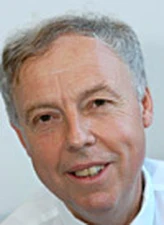Sierd A.P.L. Cloetingh

The 2006 Stephan Mueller Medal is awarded to Sierd A.P.L. Cloetingh in recognition of his fundamental contributions to modelling continental deformation and sedimentary basin evolution, and of his outstanding leadership in international geoscience programmes.
Sierd A.P.L. Cloetingh started his studies in geology and geophysics at the University of Groningen, the city in which he was born in 1950. He subsequently moved to Utrecht University to continue in geophysics and to obtain his Ph.D. In his thesis research on evolution of passive margins and initiation of subduction zones he was pioneering in incorporating depth-dependent rheology in his numerical modelling approach.
His broad background in both geology and geophysics, his great enthusiasm for Earth Sciences, his talent for discovering and opening up new opportunities and his seemingly inexhaustible energy have all been key elements in Sierd A.P.L. Cloetingh’s remarkable career.
nspired by his first professor in Groningen, the great sedimentologist Prof. P.H. Kuenen, Cloetingh developed a special interest in sedimentary basins. His geophysics background led him to adopt a lithospheric scale view, as well as a quantitative numerical modeling approach. He obtained an international reputation by his early work on the relation between relative sealevel changes and temporal variations in lithospheric stress field.
In 1988 he was appointed as full professor of Tectonics at the Vrije Universiteit in Amsterdam. In only a couple of years Sierd A.P.L. Cloetingh succeeded in establishing a strong group with excellent international connections, which rapidly rose to international prominence in the field of sedimentary basins research. He and his co-workers explored numerous aspects of sedimentary basin evolution and related tectonic processes, mostly concerning the evolution of the European continental lithosphere. In many cases he succeeded in crossing boundaries between hitherto separated subdisciplines, thereby achieving successful integration and very significant innovation.
Around 1990 Cloetingh realized the great opportunities provided by the political developments in Europe. He developed intensive and very successful collaborative research programs with scientists from Eastern Europe, thereby having a keen interest in the fostering of young talents. Out of the total of 50 students that finished a Ph.D. thesis under his supervision 18 came from abroad, and many of them from Eastern European countries. Several of these are now prominent, internationally oriented scientists in their own countries, playing a crucial role in continuing and extending international cooperation.
The quality and diversity of Cloetingh’s scientific achievements and the special attention he has given to international cooperation is apparent from his publication record (author or co-author on more than 220 papers) and from the 25 special volumes of which he has been the editor.
A noteworthy feature of Sierd A.P.L. Cloetingh’s career is his long list of prominent international functions, among which the EGS presidency in the period 1998-2000 and, since 2004, the presidency of the International Lithosphere Programme. Together they testify of his outstanding leading role in the European Geosciences community.
A large number of very prestigious awards and several honorary doctorates have been bestowed upon him. It is extremely appropriate that the European Geosciences Union honours Sierd A.P.L. Cloetingh with the Stephan Mueller Medal in recognition of his fundamental contributions to modelling continental deformation and sedimentary basin evolution, and of his outstanding leadership in international geoscience programs.
